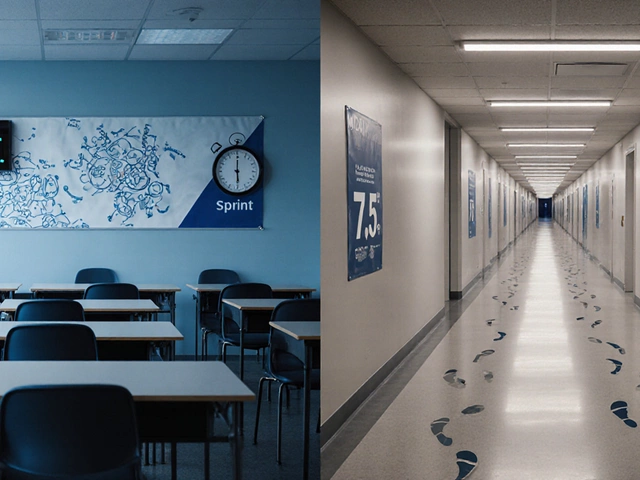
MBA Salary ROI Calculator
Your MBA ROI Analysis
When you hear that an MBA can be a ticket to a fatter paycheck, you probably wonder how much of that promise is real. Below we break down the numbers, the factors that matter, and the math you can run to see if an MBA salary increase is worth the time and money.
Quick Takeaways
- On average, MBA graduates earn 50‑70% more than they did before the program.
- Top‑ranked schools can push that boost to 100% or more, while lower‑ranked programs often see 30‑40% gains.
- Location, industry, pre‑MBA experience, and network are the biggest salary drivers.
- Typical payback periods range from 2.5 to 5 years, depending on tuition, lost wages, and post‑MBA salary.
- If the numbers don’t line up for you, certifications, specialized master’s degrees, or experiential learning may give a better ROI.
What Exactly Is an MBA?
MBA is a graduate degree focused on business management, leadership, and strategic thinking. It typically takes two years full‑time, though part‑time and online tracks exist. The credential is offered by business schools around the world and is often seen as a fast‑track to senior roles.

How Much Do MBAs Actually Earn?
Salary data comes from sources like PayScale, Bloomberg Businessweek, and the Financial Times MBA ranking surveys. The median base salary for MBA grads in the United States in 2024 was about $115,000, compared with $75,000 for those with only a bachelor’s degree. That’s a 53% jump.
Here’s a snapshot of post‑MBA earnings by school tier (figures are 2024 median base salaries):
| School Tier | Median Base Salary | Typical % Increase vs. Pre‑MBA |
|---|---|---|
| Top‑10 global schools | $150,000 | ≈100% |
| Tier 2 (rank 11‑30) | $130,000 | ≈75% |
| Tier 3 (rank 31‑100) | $115,000 | ≈55% |
| Regional / online programs | $95,000 | ≈30% |
Notice the wide spread. Your personal boost will probably land somewhere between the tier you attend and the industry you enter.
Why Do Salaries Vary So Much?
Three broad forces shape the salary outcome:
- School reputation matters because recruiters often use rankings as a shortcut for candidate quality. Top schools also have stronger alumni networks that open doors to high‑paying roles.
- Industry choice is critical. Finance, consulting, and tech tend to pay the most to MBA grads, while non‑profit or government roles typically offer modest bumps.
- Geography influences pay. MBAs in the United States, especially in New York, San Francisco, and Chicago, see the biggest numbers. Salaries in emerging markets can still be good but often come with lower absolute figures.
Other variables include your pre‑MBA work experience (four‑year veterans often negotiate higher offers) and the strength of the school's career services team, which can accelerate job placement.
Calculating the ROI of an MBA
ROI is basically (Total Additional Earnings - Total Cost) ÷ Total Cost. Let’s walk through a simple example.
- Tuition & fees: $80,000 (average for a two‑year full‑time program).
- Opportunity cost: If you earned $75,000 per year before the MBA, two years out of the workforce equals $150,000 of foregone salary.
- Total cost: $80,000 + $150,000 = $230,000.
- Post‑MBA salary: $115,000 base plus $15,000 bonus, total $130,000.
- Additional earnings per year: $130,000 - $75,000 = $55,000.
- Payback period: $230,000 ÷ $55,000 ≈ 4.2 years.
If you attend a top‑tier school where the median post‑MBA salary is $150,000, the payback shortens to roughly 2.5 years.
Don’t forget financial aid and scholarships, which can cut the tuition component dramatically and improve ROI.
When an MBA Might Not Be the Best Bet
If the math above gives you a payback period longer than you’re comfortable with, consider alternatives that still boost earnings:
- Specialized master’s degrees (e.g., Master’s in Data Analytics, Financial Engineering) often cost less and align closely with high‑pay tech roles.
- Professional certifications such as CPA, CFA, PMP, or AWS Solutions Architect can deliver 20‑30% salary lifts without a two‑year classroom commitment.
- Executive education short programs (weeks to months) can add a credential on your résumé without a full degree.
- On‑the‑job experience - taking on stretch assignments, leading cross‑functional projects, or moving to a high‑growth startup can fast‑track earnings.
These paths often have lower opportunity costs and can be combined with a part‑time MBA later if you still want the brand boost.
Decision Checklist: Is the Salary Boost Realistic for You?
- Identify your pre‑MBA salary and projected career trajectory.
- Research the average post‑MBA salary for schools in the tier you’re targeting and for the industry you aim to enter.
- Calculate total cost (tuition, fees, opportunity cost, living expenses).
- Run the ROI formula and see if the payback period fits your financial comfort zone.
- Check scholarship and employer‑sponsorship options to lower tuition.
- Assess non‑salary benefits: network, leadership exposure, personal growth.
- Compare with alternative credentials that could give a similar salary lift for less cost.
If the numbers line up and you value the intangible perks, the MBA can indeed raise your earnings. If the ROI looks shaky, explore the alternatives first.
Frequently Asked Questions
What is the average percentage increase in salary after an MBA?
Across the United States, MBA graduates see a median salary bump of about 50‑70% compared with their pre‑MBA earnings. Top‑tier schools can push that increase to near 100%.
How long does it usually take to recoup the cost of an MBA?
Typical payback periods range from 2.5 years for graduates of elite programs to 5 years for regional or online schools, depending on tuition, lost salary, and post‑MBA compensation.
Do MBA graduates in non‑finance industries still earn more?
Yes, but the increase is smaller. In technology and consulting, salary gains often exceed 60%, while in non‑profit or government sectors the boost may be 20‑30%.
Can I get a good ROI with a part‑time or online MBA?
Part‑time or online programs usually cost less and let you keep earning, which reduces opportunity cost. However, the salary boost may be lower because many employers weigh full‑time, elite programs more heavily.
Are there scholarships that meaningfully improve MBA ROI?
Many schools offer merit‑based and need‑based scholarships covering 10‑50% of tuition. Employer sponsorships can also offset costs, sometimes covering the full tuition, dramatically shortening the payback window.
At the end of the day, the answer to "Does an MBA actually increase salary?" is a qualified yes - but only if you pick the right program, plan the finances, and target high‑paying industries. Do the math, weigh the alternatives, and you’ll know whether the investment pays off for you.




